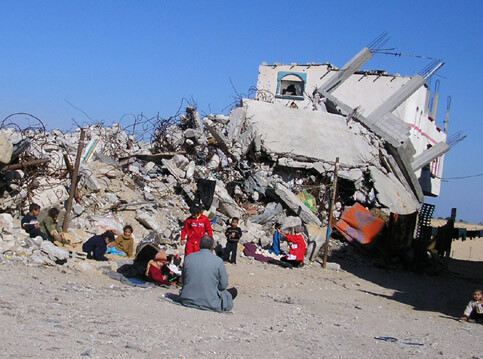United Nations Children's Fund 28 July 2005

Children make up about half of the Gaza Strips population of 1.2 million. They live in one of the most densely populated places on earth and one of the most tense and isolated. (Arjan El Fassed)
GAZA -– With less than a month remaining before Israel’s disengagement from the Gaza Strip, UNICEF has completed final deliveries of aid supplies to some of the most isolated enclaves in the area.
In preparation for the mid-August disengagement, the organization has also expanded activities in psychosocial support, health and education.
The disengagement plan calls for the evacuation of some settlements and installations. Because of their close proximity to the soon-to-be-evacuated settlements, many enclaves in Gaza are being sealed off, making humanitarian aid deliveries virtually impossible for the next several weeks.
This is why special attention has been devoted to these areas, some of which are currently accessible only by a single gate for a few hours a day.
Last week UNICEF was able to complete a final aid delivery to the Al Sayafa enclave, consisting of recreational, educational and water and sanitation supplies, along with one generator.
Children face daily danger
Children make up about half of the Gaza Strip’s population of 1.2 million. They live in one of the most densely populated places on earth – and one of the most tense and isolated. They have few safe play spaces and are frequently exposed to the line of fire, at school or at home. After years of conflict, few of them can imagine any other way of life.
With few playgrounds, many children wander perilously close to military positions or settlements, where unexploded ordnance (UXO) is a constant threat. First-time visitors to the Gaza Strip are often taken aback by how many children they see with UXO injuries.
Poor nutrition is also a widespread problem in the area. Three quarters of the population of Gaza lives under the poverty line; breakfast often means a single cup of tea. The lack of nutritious food results in stunted growth for one in 10 children.
UNICEF is supporting the creation of 15 alternative play areas for some 50,000 children living near sensitive areas. Daily activities will be provided, including instructional plays on how to avoid UXO. Recent aid shipments to Gaza include ‘school-in-a-box’ kits, remedial education materials and safe water kits to help ensure a supply of drinkable water.
UNICEF’s work has received financial support from the Canadian International Development Agency (CIDA), the UK National Committee for UNICEF and the governments of Belgium, Denmark and the Netherlands.
Related Links